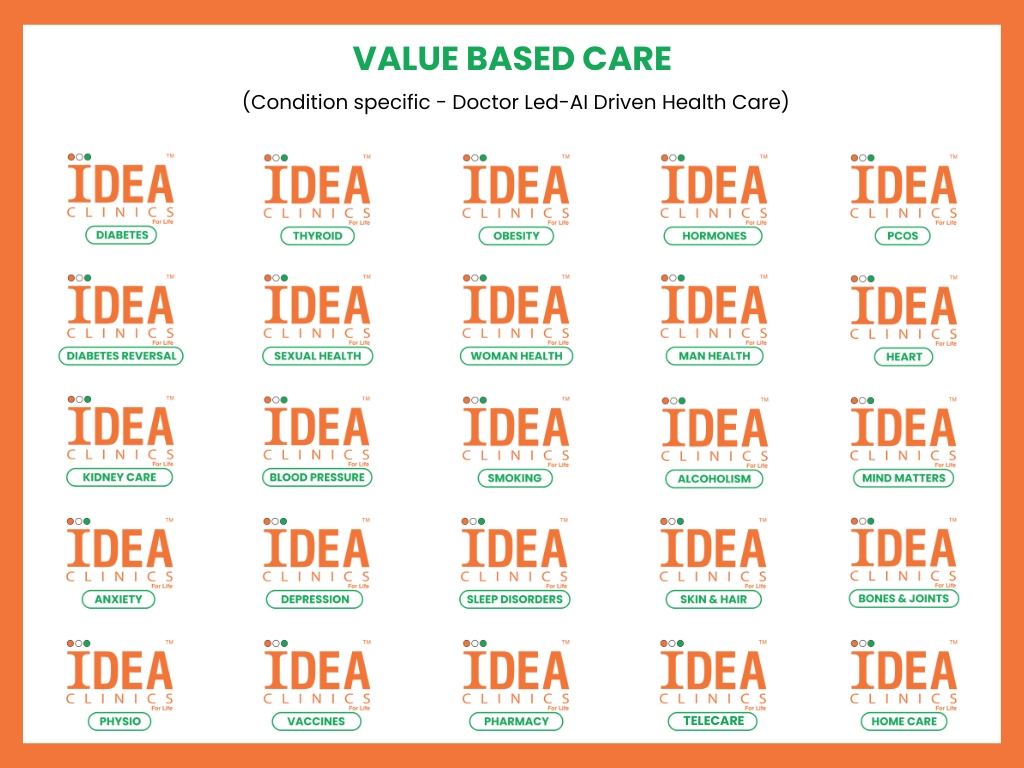(Condition specific – Doctor Led – AI Driven Health Care)
Value-based healthcare is an approach to healthcare that focuses on delivering the best possible outcomes for patients while optimizing the use of resources. In India, there is a growing interest in Value-Based Care as a way to improve the quality of care and reduce costs. Present health care in India remains transactionalwith patient having to purchase care at consultation, diagnostics, pharmacy or procedures without any consequences on outcomes from those interactions.
Value-Based Care is a health care delivery model under which providers are paid based on the health outcomes of their patients and the quality of services, rather than based on number of encounters or the volume of services rendered. It focuses on delivering value to the patient and the whole delivery matrix revolves around patients. Value based care can achieve better care and patient experiences with better population health at reduced costs to all stakeholders.
Technology can assist in facilitating value based care, an electronic health record with analytics supported by telehealth, home care, and tech assisted services. One of the key challenges in implementing value based care in India is the lack of standardized data collection and measurement systems. This makes it difficult to measure outcomes and determine which treatments or interventions are most effective.

Ideaclinics is focusing on delivering high-quality, patient-centered care that is based on evidence and best practices.
Here are some steps that can be taken to implement this model:
- Identify Target Conditions: The first step is to identify the target conditions that will be the focus of the value-based care delivery model.
- Define Outcomes and Metrics: The next step is to define the outcomes and metrics that will be used to measure the success of the program. These may include measures such as patient satisfaction, improved health outcomes, reduced hospital admissions, and lower costs.
- Create Care Teams: Value-based care delivery requires a team-based approach that includes healthcare providers, care coordinators, and other healthcare professionals. The team should be trained to provide coordinated, patient-centered care that is tailored to the specific needs of the patient.
- Implement Care Pathways: Care pathways are standardized protocols that outline the steps of care for a specific condition. These pathways can help ensure that patients receive consistent, evidence-based care and can reduce variation in care delivery.
- Use Data Analytics: Data analytics can be used to track outcomes, identify areas for improvement, and optimize care delivery. By analyzing data from electronic health records, and other sources, healthcare organizations can identify patterns and trends that can inform quality improvement efforts.
- Engage Patients: Patient engagement is a critical component of value-based care delivery. Patients should be involved in their care and encouraged to take an active role in managing their health. This may include providing patient education, promoting self-management, and using digital health tools to support patient engagement.
Overall, implementing a value-based condition-specific healthcare delivery model requires a collaborative effort between healthcare providers, patients, and other stakeholders. By focusing on improving outcomes and reducing costs for specific health conditions, this model has the potential to improve the overall quality of care while also reducing healthcare spending.



